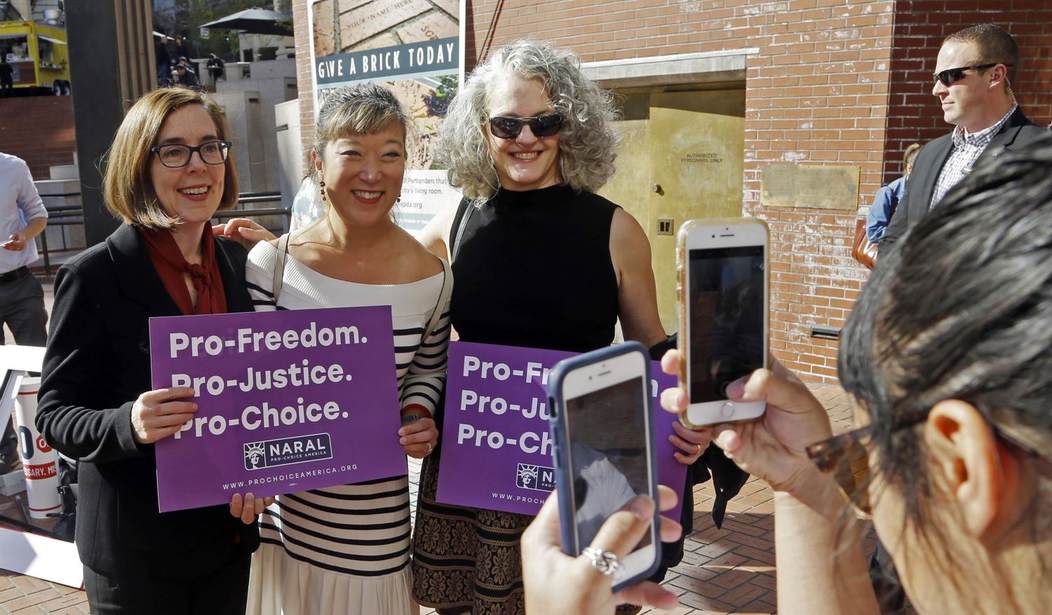Abortion is good for business, according to a new report lauded by the media. But its argument fails to address a few key points, namely that a woman’s worth far exceeds her economic output and that abortion destroys millions of future employees and consumers.
On January 21, Rhia Ventures released a report called Hidden Value: The Business Case for Reproductive Health. The self-described social investment company that promotes “Women’s Reproductive Health” partnered with consulting firm FSG in an attempt to stress the “link between access to reproductive health care and business performance” by showing “why and how access to comprehensive reproductive health care is important to a company’s bottom line.”
Both the media and major companies appear to be taking it seriously.
For its findings, the report interacted with 39 companies, including 24 companies in the Fortune 500, and relied on research, including from the firm PerryUndem. It compiled five reasons why “reproductive health care should be a priority” for businesses: Attracting talent, keeping talent, offering “high-impact benefits” with “low-cost investments,” promoting diversity and inclusion, and preparing for scrutiny by Americans.
That’s because Americans want abortion and the risks are actually “overstated for companies taking a public stand,” the report – in which companies notably remained anonymous – insisted.
In their coverage, media outlets accepted the report without question. One Forbes headline declared, “Employees Want Reproductive Care. Smart Firms Will Ensure They Get It.”
Contributor Janet Burns wrote about the report that “offers practical insights” and “shows how much US workers value their reproductive care options, and how much employers stand to benefit, and save, by providing them.”
Recommended
Rewire’s piece – by Equity Forward advisor Mary Alice Carter, Tara Health Foundation director Jen Stark, and UltraViolet director Sonja Spoo – agreed on “Why Businesses Should Support Reproductive Rights.”
Carter, Spoo, and Stark (who contributed to the report itself) pointed to businesses’ growing interest in abortion, from Netflix, Disney, WarnerMedia, and NBCUniversal opposing Georgia’s fetal heartbeat law to an ad published last year in The New York Times listing more than 180 business leaders declaring their support of abortion.
The report “makes the case that businesses need to actively support abortion access—not because it’s the right thing to do (though it is), but because it’s a good investment,” the three wrote.
As the report argued, “Contraception and abortion are critical components of a broader reproductive health package that ensures women and their partners can effectively plan for when and how to have children and fully participate in the workforce.”
Although, abortion coverage is clearly not a deal breaker if, as the report says, “69% of women with health insurance currently do not know whether their coverage includes abortion.”
At one point, the report listed personal stories about “How the Reproductive Health Gap Impacts Workers.” All three of the stories related to abortion unintentionally showed that women turned to abortion because they felt like they had no other choice.
Amanda, 22, “knew that she could not support a fifth child,” according to the report. And when she took time off for an abortion, she lost her job.
“J.” also “couldn’t afford another child.” After her abortion, she was hired for a job operating heavy machinery that, she says, she wouldn’t have been considered for if she had kept her baby.
Siggy’s girlfriend had an abortion at a time when they had “few financial resources.”
There are solutions here that companies should consider. Abortion is not one of them. Abortion allows businesses to pretend to make women equal to men by treating women as no different from men, when instead companies should appreciate and accommodate their unique abilities to conceive and bear children. It serves as a “quick fix,” and excuses businesses from addressing the root problems of fair wages, flexible-work options, and family-friendly policies that benefit children – their future consumers, their future employees.
The report touted statistics like “86% of women state that controlling if and when to have children has been important to their careers” and “a majority of college-educated women (56%) say they would not apply to a job in a state that has recently banned abortion.” But what if businesses supported women more with alternatives to abortion – alternatives that empowered them to know that they could choose life and still succeed professionally?
Still, the report added that abortion, among other things, “is a foundational element of women’s ability to seek education, employment, professional development, and growth.”
It shouldn’t be. Americans, and the businesses that value them, should promote an environment where women are appreciated and encouraged to live out their lives as women – human persons with the ability to raise children and pursue an education and employment. Abortion, instead, allows for a culture that can discriminate against women because they pursue both: a family and career.
In other words, women are more than an economic figure or business calculation. They’re human persons with inherent dignity and worth – with their own independent thoughts, desires, and goals.
The report concluded by calling on executives and investors to take action in two ways: “Ensure benefits support the spectrum of employees’ reproductive health needs,” including “unrestricted coverage for abortion,” and “engage on reproductive health policy.”
“The companies that support reproductive health will see strong and continuous dividends through improved participation, productivity, and advancement for women and their partners in the workplace,” the report finished.
But, it forgets, there’s more to life than the workplace.

























Join the conversation as a VIP Member